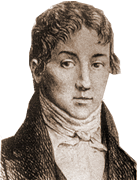Manuel de Sarratea
Manuel de Sarratea y Altolaguirre (Buenos Aires, Viceroyalty of Peru, August 11, 1774 - Limoges, France, September 21, 1849) was an Argentine diplomat, politician, and soldier.
The First Triumvirate
He was born on August 11, 1774 in the city of Buenos Aires, the son of Martín Simón de Sarratea e Idígoras, a native of Oñate, Guipúzcoa, and Tomasa de Altolaguirre and Pando Patiño.
He was educated in Madrid. He returned to the country in order to intervene in a diplomatic mission. He participated in the May Revolution of 1810 and on the advice of Dr. Belgrano was ambassador to Lord Strangford in Rio de Janeiro, where he had little success. When the First Junta was dissolved, he was part of the government that succeeded it, the so-called First Triumvirate.Among its measures was a treaty with Viceroy Francisco Javier de Elío, ceding the Banda Oriental to him.
In 1812, after the change of authorities in Montevideo, the treaty was broken and the war against the royalists of that city was restarted. Most of the easterners had abandoned the territory, following their leader, José Artigas. Sarratea took charge of the army in the Banda Oriental, considering that his main mission was to take away the troops from Artigas. He tried it by good means and then by bribery; as he was unsuccessful, he declared Artigas a traitor. But this measure was rejected by the rest of the Triumvirate.
Meanwhile, the Triumvirate was dominated by its minister Bernardino Rivadavia, until its fall in October 1812. Despite no longer being part of the government, Sarratea continued in charge of the army until early the following year, when he was replaced by Jose Rondeau. Only when the former triumvirate left did Artigas and his men join the siege of Montevideo.
He remained inactive for more than two years, until Director Gervasio Posadas sent him on a diplomatic mission to Madrid and London. Upon arriving in Spain, he offered the king the submission of the United Provinces of the Río de la Plata to the Spanish crown under a certain autonomy. But he was treated as a representative of a group of rebels, and had to flee to England. There he met two other ambassadors, Belgrano and Rivadavia, whom he convinced of an idea: to crown a brother of Fernando VII, Francisco de Paula de Borbón, as king of the Río de la Plata, with the endorsement of his father, Carlos IV. Negotiations went quite far, even drafting a monarchical constitution; as the prince himself refused, they planned to kidnap him to crown him in Buenos Aires.
Governor of Buenos Aires
He returned to the Río de la Plata in the middle of 1816 and was Minister of Government and Foreign Relations of the Directorate, under Juan Martín de Pueyrredón. He resigned for health reasons, and immediately came into contact with the Buenos Aires federal opposition, ending up in exile in Montevideo by order of the Director himself.
After the battle of Cepeda, he joined the federal army led by Estanislao López and Francisco Ramírez. They sent him as their representative before the Cabildo of Buenos Aires, which he convinced to name him governor. He took office on February 18, 1820. Immediately he signed the Treaty of Pilar with the federal chiefs, by which the province was recognized as equal to the other United Provinces.
Among the secret clauses of the Treaty, he promised to deliver important weapons to the victorious warlords. When the military found out that he was handing them over, they rose up against him and deposed him on March 6, naming General Juan Ramón Balcarce in his place. But he remained in power for less than a week, because General Ramírez threatened to attack the city if the agreed delivery was not fulfilled.
He took office again on March 11, and also ceded some military units to Ramírez, under the command of Colonel Lucio Norberto Mansilla. He was unable to contain the permanent state of anarchy in which the province was struggling or return to obedience to the military, for which he resigned in May.
He joined Ramírez's army in its campaign against Artigas, and his defeat was perhaps his greatest personal success. He also participated in the preparations for the war of the Entre Ríos caudillo against Buenos Aires, Santa Fe and Córdoba, which ended in disaster. For a time he was away from politics.
On July 29, 1821, the former friends of General Manuel Belgrano met at the house of Manuel de Sarratea to hold a banquet in honor of the hero, who died a year earlier. Some eighty people were summoned and the event was opened with a toast from Bernardino Rivadavia. At the evening it was proposed that a street and a town be named after Belgrano. This would take place after the fall of Rosas with the expropriation of his land in the current Belgrano neighborhood of the city of Buenos Aires.
Diplomatic missions
On August 31, 1825, Juan Gregorio de Las Heras appointed Sarratea as "Chargé d'Affaires of the United Provinces of the Río de la Plata near S.M.B."".
President Rivadavia sent him in 1826 to carry out various diplomatic missions in England. In London he supported the English policy of supporting the separation of the Banda Oriental from the other Argentine provinces, which was achieved in mid-1828. Governor Manuel Dorrego kept him in his post, and Juan Manuel de Rosas appointed him his ambassador in Rio de Janeiro and France. He died on September 21, 1849 in Limoges.
One of his brothers, Juan Crisóstomo José de Sarratea, was an influential merchant of the time who contributed from his activity to the campaigns of the Army of the Andes.
Contenido relacionado
821
379
139
